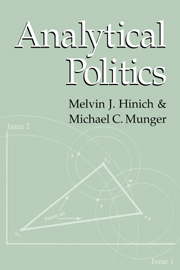9 - The nature of issues in mass elections
Published online by Cambridge University Press: 05 June 2012
Summary
I remember standing at the polls one day, when the anger of the political contest gave a certain grimness to the faces of the independent electors, and a good man at my side looking on the people, remarked, “I am satisfied that the largest part of these men on either side mean to vote right.” I suppose considerate observers, looking at the masses of men in their blameless, and in their equivocal actions, will assent that in spite of selfishness and frivolity the general purpose in the great number of persons is fidelity. The reason why any one refuses his assent to your opinion, or his aid to your benevolent design, is in you; he refuses to accept you as a bringer of truth, because, though you think you have it, he feels that you have it not. You have not given him the authentic sign.
(Ralph Waldo Emerson, “New England Reformers: A Lecture Read before the Society in Armory Hall,” Sunday, March 3, 1844)This book is about analytical politics. As we noted in Chapter 1, this phrase implies “breaking down” political phenomena into their components and considering theoretical propositions that unify or differentiate these phenomena. However, with only a few exceptions, such as the analysis of turnout in Chapter 7, what we have “analyzed” is voting in committees. In this final chapter, we discuss some recent advances in the ongoing attempt to apply analytical political theory to mass elections.
- Type
- Chapter
- Information
- Analytical Politics , pp. 180 - 212Publisher: Cambridge University PressPrint publication year: 1997



